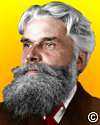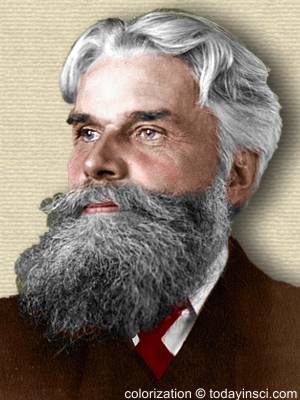 (source)
(source)
|
Havelock Ellis
(2 Feb 1859 - 8 Jul 1939)
British physician, sexologist and writer who compiled the seven-volume Studies in the Psychology of Sex. Although the first detached treatment of the subject, it was still highly controversial when published (1897-1928).
|
Science Quotes by Havelock Ellis (19 quotes)
“Auto erotism,” … spontaneous solitary sexual phenomena of which genital excitement during sleep may be said to be the type.
— Havelock Ellis
Psychology of Sex (1933), 91.
Courtship, properly understood, is the process whereby both the male and the female are brought into that state of sexual tumescence which is a more or less necessary condition for sexual intercourse. The play of courtship cannot, therefore, be considered to be definitely brought to an end by the ceremony of marriage; it may more properly be regarded as the natural preliminary to every act of coitus.
— Havelock Ellis
Studies in the Psychology of Sex (1921), Vol. 3, 239.
Fiction is, indeed, an indispensable supplement to logic, or even a part of it; whether we are working inductively or deductively, both ways hang closely together with fiction: and axioms, though they seek to be primary verities, are more akin to fiction. If we had realized the nature of axioms, the doctrine of Einstein, which sweeps away axioms so familiar to us that they seem obvious truths, and substitutes others which seem absurd because they are unfamiliar, might not have been so bewildering.
— Havelock Ellis
In The Dance of Life (1923), 86.
I regard sex as the central problem of life. And now that the problem of religion has practically been settled, and that the problem of labor has at least been placed on a practical foundation, the question of sex—with the racial questions that rest on it—stands before the coming generations as the chief problem for solution. Sex lies at the root of life, and we can never learn to reverence life until we know how to understand sex.
— Havelock Ellis
Studies in the Psychology of Sex (1897), Vol. 1, xxx.
In mathematics it is notorious that we start from absurdities to reach a realm of law, and our whole (mathematical) conception of the world is based on a foundation which we believe to have no existence.
— Havelock Ellis
In The Dance of Life (1923), 86.
It is here [in mathematics] that the artist has the fullest scope of his imagination.
— Havelock Ellis
In The Dance of Life (1923), 138-139.
It is only in mathematics, and to some extent in poetry, that originality may be attained at an early age, but even then it is very rare (Newton and Keats are examples), and it is not notable until adolescence is completed.
— Havelock Ellis
In A Study of British Genius (1904), 142
Reproduction is so primitive and fundamental a function of vital organisms that the mechanism by which it is assured is highly complex and not yet clearly understood. It is not necessarily connected with sex, nor is sex necessarily connected with reproduction.
— Havelock Ellis
Psychology of Sex (1933), 7.
Sir Isaac Newton, the supreme representative of Anglo-Saxon genius.
— Havelock Ellis
In Study of British Genius (1904), 49.
The Anglo-Dane appears to possess an aptitude for mathematics which is not shared by the native of any other English district as a whole, and it is in the exact sciences that the Anglo-Dane triumphs.
— Havelock Ellis
In A Study of British Genius (1904), 69. As quoted and cited in Robert Édouard Moritz, Memorabilia Mathematica; Or, The Philomath’s Quotation-Book (1914), 131. Moritz adds an editorial footnote: “The mathematical tendencies of Cambridge are due to the fact that Cambridge drains the ability of nearly the whole Anglo-Danish district.”
The by-product is sometimes more valuable than the product.
— Havelock Ellis
In Little Essays on Love and Virtue (1922), 66.
The larger our great cities grow, the more irresistible becomes the attraction which they exert on the children of the country, who are fascinated by them, as the birds are fascinated by the lighthouse or the moths by the candle.
— Havelock Ellis
In The Task of Social Hygiene (1912), 178.
The mathematician has reached the highest rung on the ladder of human thought.
— Havelock Ellis
In The Dance of Life (1923), 140.
The modesty of women, which, in its most primitive form among animals, is based on sexual periodicity, is, with that periodicity, an essential condition of courtship.
— Havelock Ellis
Psychology of Sex (1933), 30.
The Promised Land always lies on the other side of a wilderness.
— Havelock Ellis
In The Dance of Life (1923), 236.
The second great channel through which the impulse towards the control of procreation for the elevation of the race is entering into practical life is by the general adoption, by the educated—of methods for the prevention of conception except when conception is deliberately desired.
— Havelock Ellis
Studies in the Psychology of Sex (1913), Vol. 4, 588.
The sun and the moon and the stars would have disappeared long ago—as even their infinitely more numerous analogues on the earth beneath are likely to disappear—had they happened to be within the reach of predatory human hands.
— Havelock Ellis
In The Dance of Life (1923), 352.
What we call “Progress” is the exchange of one Nuisance for another Nuisance.
— Havelock Ellis
In Impressions and Comments (1914), 5.
Where we reach the sphere of mathematics we are among processes which seem to some the most inhuman of all human activities and the most remote from poetry. Yet it is just here that the artist has the fullest scope for his imagination. … We are in the imaginative sphere of art, and the mathematician is engaged in a work of creation which resembles music in its orderliness, … It is not surprising that the greatest mathematicians have again and again appealed to the arts in order to find some analogy to their own work. They have indeed found it in the most varied arts, in poetry, in painting, and in sculpture, although it would certainly seem that it is in music, the most abstract of all the arts, the art of number and time, that we find the closest analogy.
— Havelock Ellis
In The Dance of Life (1923), 138-139.
See also:
- 2 Feb - short biography, births, deaths and events on date of Ellis's birth.
- Havelock Ellis: Philosopher of Sex - A Biography, by Vincent Brome. - book suggestion.








 In science it often happens that scientists say, 'You know that's a really good argument; my position is mistaken,' and then they would actually change their minds and you never hear that old view from them again. They really do it. It doesn't happen as often as it should, because scientists are human and change is sometimes painful. But it happens every day. I cannot recall the last time something like that happened in politics or religion.
(1987) --
In science it often happens that scientists say, 'You know that's a really good argument; my position is mistaken,' and then they would actually change their minds and you never hear that old view from them again. They really do it. It doesn't happen as often as it should, because scientists are human and change is sometimes painful. But it happens every day. I cannot recall the last time something like that happened in politics or religion.
(1987) -- 


